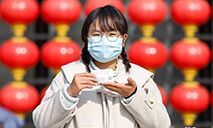U.S. reopens mass vaccination sites, suspends cruises amid COVID-19 surge
Raising vaccination rates around the world would also be good for anyone who travels. However, developed countries have raced ahead in offering booster shots, while much of the world hasn't been inoculated.
NEW YORK, Jan. 8 (Xinhua) -- Temporary mass vaccination sites that were wound down months ago across the United States are being reopened to get more people vaccinated and boosted in the latest surge of COVID-19 fueled by the Omicron variant.
"Massachusetts, New Jersey, New York, Oregon and Rhode Island are among states that have opened or are planning soon to open sites designed to administer hundreds or even thousands of shots a day," reported The Wall Street Journal on Saturday.
Officials said they are expanding capacity again largely to provide booster shots and reach children who recently have become eligible for vaccines. Many states shifted to smaller, more-targeted inoculation efforts after demand waned last summer.
Of Americans 5 years or older who are eligible to be vaccinated, 66.3 percent are fully vaccinated, according to the U.S. Centers for Disease Control and Prevention (CDC). About 38 percent of fully vaccinated adults have received booster shots.
"Officials running the mass vaccination sites say they also hope to reach some of the 27 percent of adults who aren't fully vaccinated ... Interest among unvaccinated adults hasn't risen during the Omicron surge, though," said the report.

People line up to enter a mass COVID-19 vaccination site at the United Center in Chicago, the United States, on March 10, 2021. (Photo by Joel Lerner/Xinhua)
CRUISE PAUSE
Royal Caribbean Group, an American global cruise holding company incorporated in Liberia and based in Miami of Florida, has suspended some of its cruise operations amid rising numbers of COVID-19 infections due to the Omicron variant.
The sailings of three ships, Serenade of the Seas, Jewel of the Seas and Symphony of the Seas, have been suspended while the return of its Vision of the Seas to cruising has been postponed to March 7, 2022, said a company statement on Friday.
The company also called off its Jan. 6 Spectrum of the Seas sailing in Hong Kong. This update came after Hong Kong's health department detected nine guests aboard the vessel's previous voyage who may have been exposed to COVID-19.
The CDC recently told Americans to avoid travel on cruise ships, regardless of their vaccination status. The advisory came in response to a surge in cases in recent weeks, caused by the spread of the contagious Omicron variant.
Most major cruise lines do not publicly announce the number of coronavirus cases on board their ships, but they are required to submit daily figures to the CDC. Currently, the agency is monitoring more than 90 cruise ships.

Photo taken on March 10, 2020 shows police standing guard near the Grand Princess cruise ship docking at the Port of Oakland, the United States.The Grand Princess cruise ship that carries thousands of people, including 21 coronavirus patients, docked at the Port of Oakland Monday after being held off at sea for days. (Photo by Li Jianguo/Xinhua)
TRAVEL INDUSTRY
The travel industry will have to "roll with the punches" as government requirements continue to evolve with the pandemic, Todd Handcock, President of Asia Pacific &Global Board Member Collinson International, told CNBC this week.
"The key thing is that the industry will remain in flux for the foreseeable future," he said, noting that testing and vaccinations will continue to be part of the process of travel for 2022 and possibly 2023.
Asked if verification of tests and vaccination statuses could be simplified for travel, Handcock said the goal is to have a digital, interoperable system that can be used globally. "We're still a long ways away" from that.
Raising vaccination rates around the world would also be good for anyone who travels, he said, adding that developed countries have raced ahead in offering booster shots, while much of the world hasn't been inoculated.
In addition, echoing the sentiments of experts such as those from the World Health Organization, Handcock said that COVID-19 variants will emerge as long as there are large, unvaccinated populations.

Travelers wait in line for COVID-19 testing at John F. Kennedy International Airport in New York, the United States, Jan. 3, 2022. (Photo by Michael Nagle/Xinhua)
VACCINE EFFECTS
A new scientific study showed that vaccination can cause changes to the timing of menstruation, but the effects are temporary, more akin to a sore arm than a serious adverse event, reported the National Public Radio (NPR).
"I think it's reassuring and also validating," Alison Edelman, leader of the study and professor of obstetrics and gynecology at Oregon Health &Science University in Portland, Oregon, was quoted as saying.
The work appeared Thursday in the American Journal of Obstetrics and Gynecology. Despite the effects, Edelman and other experts stressed that individuals should get vaccinated, because the risks from COVID-19 remain high.
Clinical trials for COVID-19 vaccines looked for side-effects like headaches or fever, but when it came to reproductive health, the main focus was on pregnancy, not menstruation.
"The menstrual cycle is like the stepsister that gets ignored," Edelman said. "It's considered unimportant in the grand scheme of things, but it actually really is important to people day-to-day."
Photos
Related Stories
- U.S. marks anniversary of Jan. 6 attack on Capitol
- Retired Navy admiral urges U.S. to work with China on climate, pandemic
- 2,000-odd flights canceled on New Year's Day in U.S. as result of surging Omicron
- U.S. mass shootings set record as gun violence surges in 2021
- U.S. hits COVID-19 record highs as pandemic enters third year
- Commentary: Press freedom, how many crimes are committed in thy name!
Copyright © 2022 People's Daily Online. All Rights Reserved.










